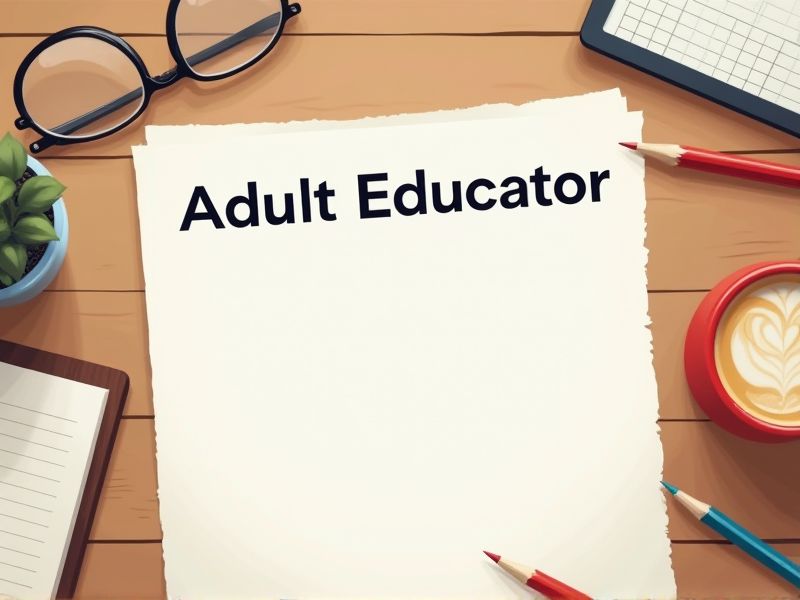
Adult educators often work with diverse learners and require specific skills to effectively address varying educational needs. Certifications provide them with structured training on modern teaching methodologies, equipping them with tools to enhance learning experiences. Many educational institutions and organizations mandate these certifications to ensure a standardized level of teaching quality and expertise. Some important certifications you may need as an adult educator are listed below.
Certified Adult Educator (CAE)
Certified Adult Educators (CAEs) possess specialized training that addresses the unique learning styles and needs of adult learners, leading to more effective educational experiences. The CAE certification ensures educators are up-to-date with best practices and research in adult education, thus raising the quality of instruction. Employers gain confidence in the certified educator's competencies, which can result in enhanced program outcomes. By establishing standards in adult education, CAE fosters a professional community that facilitates knowledge sharing and continuous improvement.
TESOL/TEFL Certification
TESOL/TEFL certification provides educators with essential skills and methodologies for teaching English to non-native speakers, ensuring instructional effectiveness. Adult learners often face unique challenges, and certification equips educators to address varied learning styles and language proficiency levels. Employers and educational institutions generally require TESOL/TEFL certification to ensure adherence to recognized teaching standards. Certification aids in professional credibility and opportunities for career advancement in the field of English language education.
Certificate in Adult Learning Principles
An Adult Educator with a Certificate in Adult Learning Principles gains insight into how adults process information differently, enhancing teaching effectiveness. The certificate ensures the educator is equipped with strategies tailored to adult learners, improving engagement and retention rates. Understanding adult learning principles helps in addressing diverse learning needs, fostering a more inclusive educational environment. The credential also lends credibility, potentially opening up more career advancement opportunities within educational institutions.
Instructional Design Certificate
An Instructional Design Certificate equips adult educators with structured methodologies for developing comprehensive learning materials. Expertise in instructional design ensures that learning experiences are impactful and cater to diverse learner needs. Possessing this certification can enhance an educator's credibility, which may lead to career advancement opportunities. Furthermore, it provides a deeper understanding of learning technologies and how they can be integrated effectively into educational programs.
Certified Professional in Learning and Performance (CPLP)
Obtaining a Certified Professional in Learning and Performance (CPLP) credential enhances an adult educator's credibility, distinguishing them in a competitive professional landscape. The certification validates expertise in designing and implementing effective learning programs, aligning educational initiatives with organizational goals. With CPLP, adult educators gain access to a network of peers and resources, which fosters continuous professional growth and development. Employers often seek CPLP-certified professionals due to their commitment to best practices and ability to drive performance improvements.
Online Teaching and e-Learning Certification
Online teaching and e-learning certification equips adult educators with the necessary skills to effectively deliver virtual instruction, which addresses the rising demand for flexible learning solutions. As technology advances, educators need to adapt to digital platforms to engage and support diverse learners remotely. Certification ensures that educators understand best practices in online pedagogy, enhancing the quality of instruction provided. The growing trend of remote work and learning environments requires educators to be proficient in digital tools to meet learners' expectations and needs.
Curriculum Development Certification
Curriculum Development Certification equips adult educators with the skills to design effective learning experiences tailored to adult learners' unique needs. This certification provides a structured understanding of educational frameworks, enhancing the educator's ability to improve learning outcomes. By understanding how to align curriculum with desired learning objectives, educators can ensure their programs remain relevant and engaging. Certified educators can more efficiently address diverse learning styles and challenges, boosting their professional credibility in educational settings.
Educational Technology Certification
An Educational Technology Certification enhances adult educators' ability to integrate digital tools effectively, improving instructional quality. Adult learners increasingly expect technology-driven learning environments, and certification ensures educators can meet this demand competently. Certification provides educators with a structured understanding of emerging technologies, which is crucial as the digital landscape evolves rapidly. By obtaining certification, adult educators demonstrate a commitment to professional development, promoting trust and credibility among learners and institutions.
Adult Literacy Specialist Certification
Adult Literacy Specialist Certification equips educators with the skills necessary to address diverse learning needs among adult learners. Without this certification, educators might struggle to effectively teach individuals with varying literacy levels. Certification ensures that instructors are up-to-date with the latest teaching methodologies and technologies. Having certified educators can lead to improved outcomes in literacy rates, impacting the individual's quality of life and their broader community.
Leadership in Adult Education Certification
Leadership in Adult Education Certification enhances an educator's ability to design effective learning strategies, leading to improved educational outcomes. The certification equips educators with leadership skills that foster a collaborative learning environment, increasing student engagement. It provides educators with a deeper understanding of adult learning theories, enabling them to tailor content to diverse learner needs. Institutions often recognize certified leaders in education as having a higher competence in handling complex learning scenarios, improving their career prospects.
Summary
With additional certifications, you can enhance your teaching credibility and expand your career opportunities. Certification leads to increased competence, resulting in improved student engagement and learning outcomes. Earning credentials often allows access to higher salaries and more specialized teaching roles. Obtaining certifications aligns you with the latest educational trends and methodologies.
